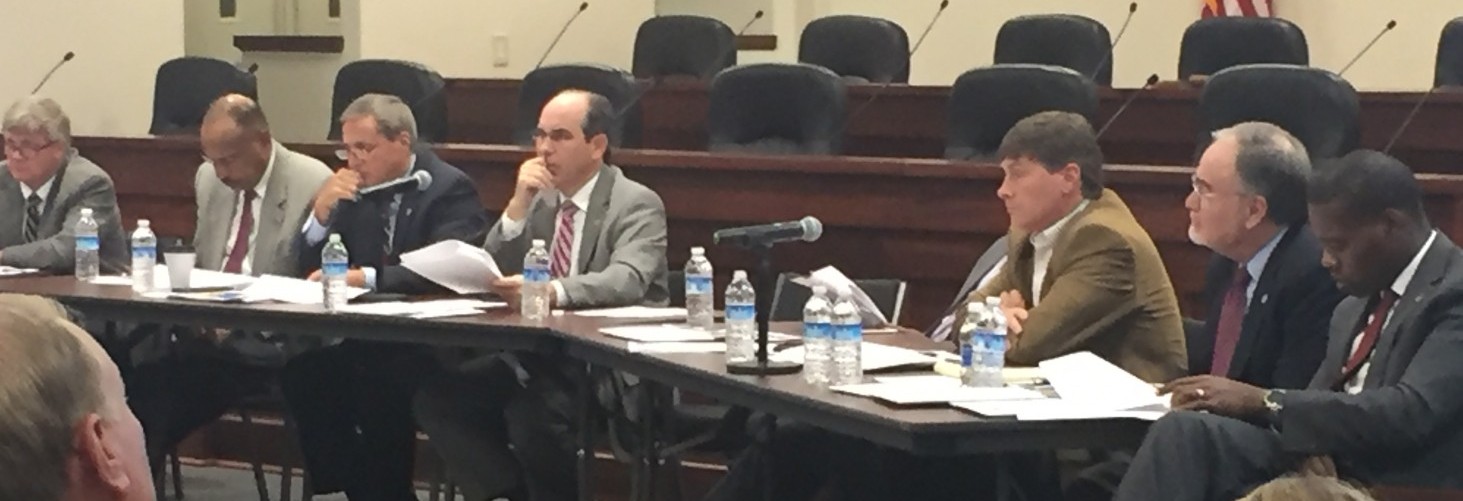By Chip Brownlee
Alabama Political Reporter
MONTGOMERY—Legislators are attempting to find a long-term fix for Alabama’s seemingly endless General Fund budgeting woes. But that long-term fix seems far in the distance.
Today, officials from the executive branch offered their input to the Legislative Task Force on Budget Reform, a joint committee of the Alabama Legislature tasked with finding that solution.
Newly appointed State Finance Director Clinton Carter posed several ideas to the joint committee, including reforming agency budget rollovers and implementing a “race to the bottom” budgeting concept.
Currently, State agencies are allowed to “roll over” their budget surpluses to the next year. The Legislature began allowing the rollovers to encourage agencies to conserve money that may be left over at the end of the State’s fiscal year.
“Having funds that are left over implies that a group might be over funded,” Carter said Wednesday. “[Agencies] might go out, in theory, and spend money on inefficient activities and things that aren’t necessary. You would sometimes see money spent on large-ticket items, automobiles, computers. The idea of budget rollover is designed to attack just that.”
The problem is that some groups can begin accumulating large sums of carryover funds, or “war chests” as Carter put it. In 2015 and 2016, ALEA carried over more than $30 million. The Alabama Department of Transportation carried over more than a billion dollars last year.
Having the war chests isn’t necessarily a bad thing. Large carryovers can soften the blow of a budget cut and, in theory, could allow the Legislature to reappropriate funds to agencies with slimmer budgets. That is if they truly knew how much money agencies had in carryover.
Earlier this year, Sen. Phil Williams, R-Rainbow City, sent letters to State agencies and higher-ed institutions to request more information on their carryover budgets. He wanted to have that info for next year’s budget hearings. Some agencies complied, but others didn’t.
Carter, who was appointed by Gov. Robert Bentley earlier this fall, suggested the Reform Task Force look into reforming the budget carryover rules, perhaps to allow agencies to keep between 80 percent of surplus funding. The other 20 percent of the carry-over funds would be reclaimed for the General Fund.
The split concept would have a minimal-enough impact on agencies’ carryovers to continue encouraging agencies to save money and discouraging spending on frivolous items, Carter said. But it would also allow a bump to the General Fund.
“An 80–20 split, with last year’s carryovers of about $50 million, would result in about a $10 million increase directly to one of the budgets that is most troubled or most hit,” Carter said.
The reform to budget carryovers was not Carter’s only suggestion. While speaking in front of the panel of representatives and senators, the new Finance Director also suggested encouraging, perhaps through legislation, a form of “race to the bottom” budgeting.
As things stand now, most agency budgets are slight modifications over the previous year’s budget. Some agencies get a bump; others get a cut. But for the most part, most agencies’ budgets are only a few percent’s difference from the last year’s.
However, when agencies come to the State’s Department of Finance to begin the budgeting process, many come with requests for budget increases of 30 or 40 percent. Carter said this makes it hard for the department to determine what an agency’s priority is.
To solve this issue, and save money for the General Fund, Carter suggested the Legislature encourage the race to the bottom approach, which would reward the agency with the slimmest request by granting that agency most or all of its request.
The agencies with larger budget increase requests wouldn’t receive as much, hopefully encouraging them to prioritize what they ask for from the General Fund.
Some Task Force members, including Sen. Bill Holtzclaw, R-Madison, seemed concerned that this approach could negatively affect some universities and agencies that are still attempting to catch up from the Great Recession’s budget cuts.
Carter was not the only official from the Executive Branch to present to the Task Force today. Michael Gamble and Joe Garrett, deputy commissioners from the Revenue Department, also proposed ideas to increase the State’s meager revenues.
Gamble said the State needs to modernize its Digital Goods taxes to catch up with the new digital economy, which is moving away from brick-and-mortar stores to online sales from companies like Amazon and others.
“The economy is moving,” Gamble said. “I used to go to the Blockbuster, and I paid rental taxes that went to the General Fund. Now, I sit at home and rent my movie online.”
Garrett, presenting before Gamble, said the changing economy has left the State’s taxes and revenues in bad shape, and for a state that heavily relies on sales taxes, that’s not good news. It has made the state rely heavily on its income taxes
Combined with extremely low property taxes, which are some of the lowest in the country, the decreasing sales tax revenue has made the state rely heavily on its income taxes.
In the 1960s, every dollar of income tax collected was matched by more than $2 of sales tax collected. Now, for every dollar of income tax, there are only 66 cents of sales tax collected. If the sales tax revenues had grown at a rate equal to income taxes, an additional $5.7 billion in revenue would be available for the General Fund.
“This trend is not going to stop,” Garrett said. “The sales tax base is not going to grow.”
The two officials said the State needs to catch up by beginning to tax the parts of the economies that have grown in recent years but have evaded taxation thus far, including online sales, which have only an optional sales tax now; online streaming; and the sharing economy, including Uber, Airbnb and others.
“We used to tax about two-thirds of the economy with our sales tax,” Garrett said. “Today, we only tax about one-third of our economy.”
Amazon began collecting an optional online 8-percent sales tax on Nov. 1 after choosing voluntarily to work with the state on the program. Thus far, revenue for the online sales taxes has exceeded $5 million.
The State is destined for another contentious Legislative Session in the spring that will see legislators, yet again, struggle to balance the General Fund as costs rise in the State’s Medicaid Agency and the Department of Corrections.
Revenues that provide money to the State General Fund remain stagnant despite the improving economy. For years, the Legislature has tried to balance the stagnant revenues with the growing costs but have avoided new taxes or other forms of revenue.
In 2015, the Legislature borrowed $80 million from the Education Trust Fund and increased some sin taxes to prop up the General Fund’s $200 million shortfall.
In September of this year, the Legislature used money from a settlement with BP over the 2011 Deepwater Horizon oil spill to prop up an $85 million shortfall in the Medicaid Agency by providing more than $120 over the next two years.
But that money is temporary, costs are increasing, and the Legislature has refused to pass any significant revenue increases. They will reconvene in February for their 2017 Regular Session.



















































